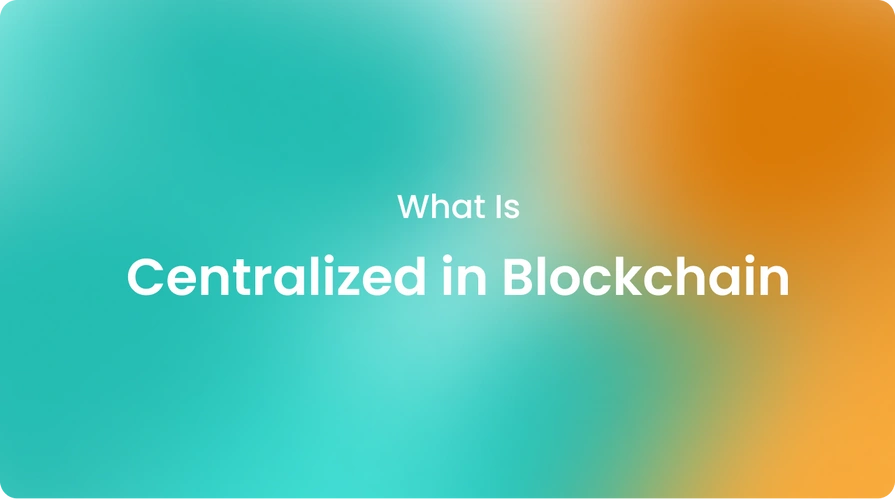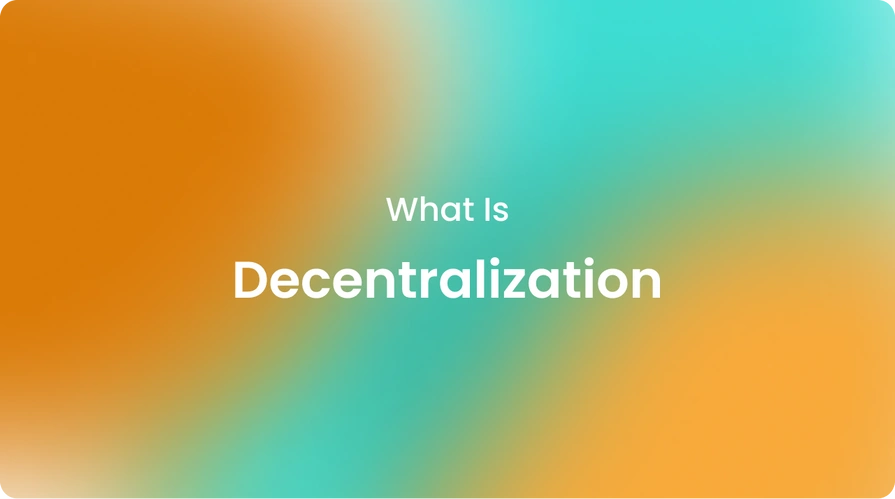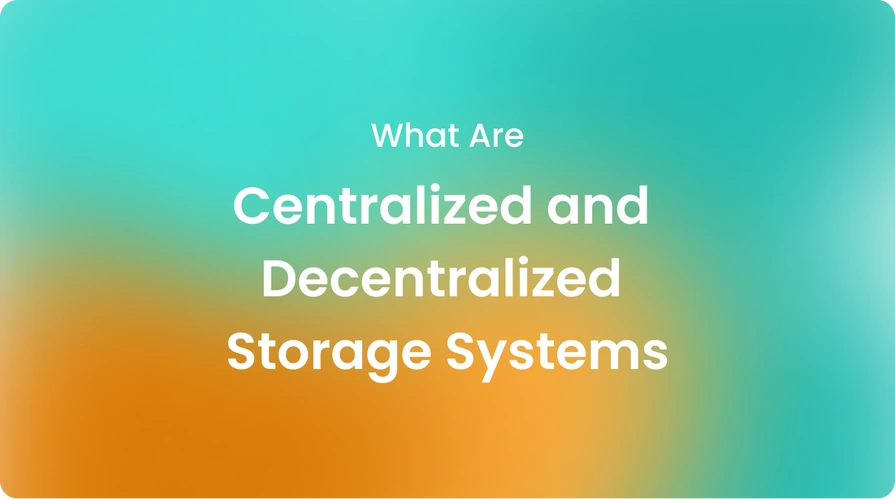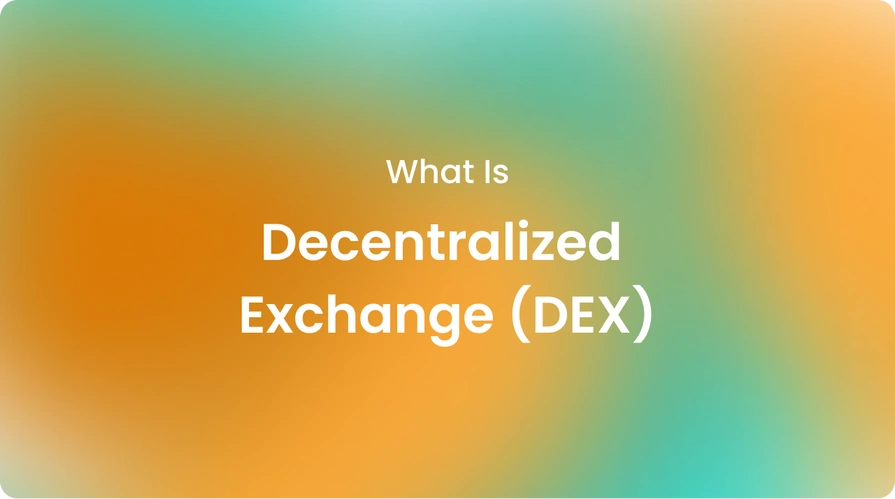|knowledgehub, technology
What Is Centralized in Blockchain?

Blockchain technology has brought about a paradigm shift in how digital transactions and data are managed, from centralized in blockchain to decentralized.
Join us in this blog as we explore the details of centralization and its differences from decentralization. The principle of decentralization, which aims to distribute authority and control away from a single entity, lies at the core of blockchain.
However, some degree of centralization remains integral to the functioning of many blockchain networks. For instance, transaction validation is one process that relies on centralized authorities in permissioned blockchains.
In such networks, a limited set of pre-approved blockchain nodes called validators are responsible for validating new blocks of transactions and adding them to the chain. This concentration of authority differs from public networks, which use a decentralized consensus protocol for validation.
What is the principle of centralization?
Centralization refers to concentrating control of data, resources, or governance within a limited number of individuals, organizations, or locations. The key principle is vesting authority and decision-making within a central body rather than distributing it among members of a network.
In traditional centralized systems like banks, a single entity has unilateral control over ledgers, user identities, and transaction processing. However, the failure or compromise of the central node can enable swift transactions, but it also introduces vulnerabilities.
What is centralization in crypto?
Stablecoins act as a prime example of centralization within cryptocurrencies. Stablecoin type of cryptocurrency aims to maintain price stability by pegging their value to real-world assets like fiat currencies.
However, centralized entities still control the reserve funds and coin issuance in this model. While stablecoins offer transparent transactions that are fast and secure, the centralization of reserves poses counterparty risks if the issuer encounters financial difficulties.
What are the pros and cons of centralization?
Centralization provides some clear benefits, like faster transaction speeds due to reduced complexity, lower infrastructure costs with fewer intermediaries involved, and easier governance with decisions taken by a single authority.
However, it also weakens security due to centralized points of failure, reduces redundancy if the central node goes offline, poses greater legal and regulatory oversight challenges, and compromises network resiliency if the central party is compromised.
What is an example of centralization?
The traditional banking system exemplifies centralization as it centralizes deposits within a small number of large financial institutions.
These institutions maintain control over accounts, payment infrastructure, and access to funds, requiring trust in their operational security and financial solvency.
Another example is internet service providers (ISPs), which centralize the routing of traffic and user data through their private networks, allowing censorship or surveillance if so compelled by governments.
Social media platforms also centralize social interactions and media consumption around their proprietary interfaces and algorithms.
In contrast, blockchains demonstrate high degrees of decentralization through their distributed consensus networks, requiring no central intermediary to facilitate value transfer globally in a censorship-resistant manner.
What is the problem with centralization?
The chief concern with centralization is that it leads to potential central points of failure. Central entities, such as exchanges or repositories, getting hacked, becoming insolvent, or losing user trust can cause systemic issues for the entire network.
History has shown that even large, established players have collapsed due to security flaws or mismanagement at the center. Control being distributed without centralized vulnerabilities reduces the risk compared to a centralized model.
What is the risk of centralization in blockchain?
Most blockchains aim to eliminate the risks of centralization through decentralization. However, even decentralized protocols face centralization pressures over time, especially as the industry evolves.
For example, crypto mining pools could potentially lead to the centralization of hash power if a few large pools dominate the network. The centralization of services like crypto exchanges and custodial crypto wallets also affects the decentralization level.
Moreover, consolidation of developer resources and governance decisions within a small set of entities increases the probability of centralized governance attacks. To mitigate these emerging centralization risks, continuous efforts are necessary.
What is the difference between decentralization and centralization?
Centralization concentrates power within a core group, while decentralization distributes it among many participants. Centralized systems offer efficiency gains but also expose vulnerabilities, such as the risk of single points of failure or control that can be exploited.
Decentralization aims to avoid these by dispersing governance through distributed consensus mechanisms such as PoW, PoS, and PoA.
Neither is absolute; most networks operate along a centralization and decentralization spectrum. The optimal balance depends on each project's unique risks and technical constraints. Achieving "weak centralization" with distributed accountability may become an important goal.
Why is decentralization important in blockchain?
Distributing control democratically among many equals is vital for blockchain's core value proposition, according to its origins in cypherpunk thinking.
Only through decentralization can blockchains truly offer accessibility, resilience, and political neutrality, free from the corruption, censorship, or failure risks that centralized systems inherit due to the concentration of power and points of control.
Decentralization ensures no single party can alter the record or restrict access. It also prevents capture by powerful private interests or governments looking to undermine the technology's social potential. Furthermore, this fulfills the original blockchain vision of users owning an open, global infrastructure.
Why is decentralization better than centralization in blockchain?
Decentralization is preferable because it leads to more stable, antifragile, and censorship-resistant networks over the long term, according to the evidence so far.
While initial decentralization brings technical challenges, concentrated power has real downsides, as history has shown: monopolies tend towards rent-seeking, stagnation, and a lack of accountability over time unless disruptive forces intervene.
Decentralized systems distribute these risks systematically instead of concentrating them, at the cost of the short-term efficiency that centralized coordination provides. Given blockchains' aims of open public goods, decentralization seems like the soundest strategy according to their founding principles.
Cryptobunq is a crypto-friendly digital bank offering various services in crypto and blockchain, including custody and wallet, exchange APIs, batch payments, node as a service, and many more. Cryptobunq serves as a one-stop-shop crypto service provider and assists projects in initiating blockchain integration.
The bottom line
Perspectives on centralization and decentralization continue to evolve as blockchain technologies mature. Achieving the right balance through decentralized coordination while allowing streamlined operations will likely remain an important area for ongoing experimentation and debate.
The long-term trend nonetheless seems to favor decentralization according to the technology's founding principles of resilience, accessibility, and neutral governance. Centralized equivalents risk undermining these core values over time through the unintended consequences of concentrated power.
If you want to get involved with blockchain and take advantage of decentralized services, consider exploring Cryptobunq solutions. As a leader in the cryptocurrency space, Cryptobunq can help both individuals and organizations navigate the opportunities of this innovative technology.
Explore our case studies and integrate crypto services into your business for prospective growth. Contact us today and adapt your individual and business projects by investing in blockchain technology with CBQ!













